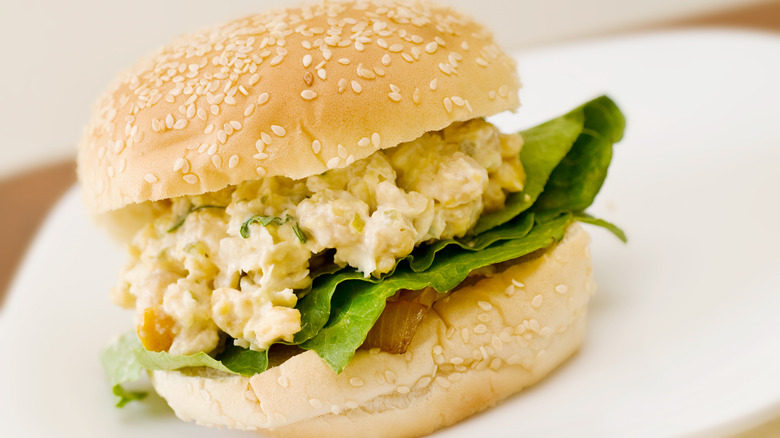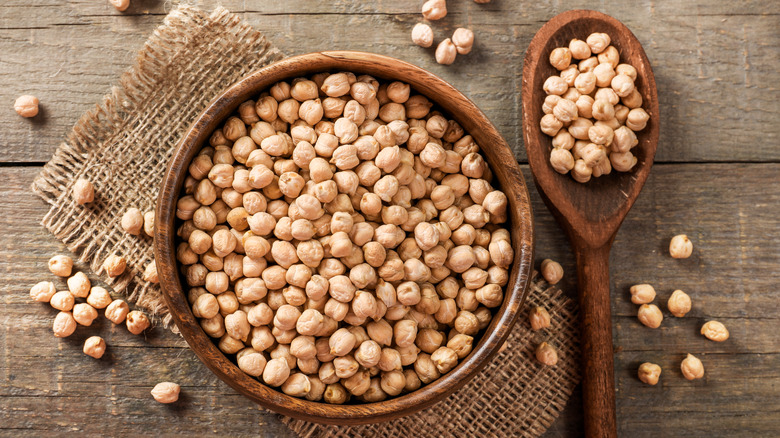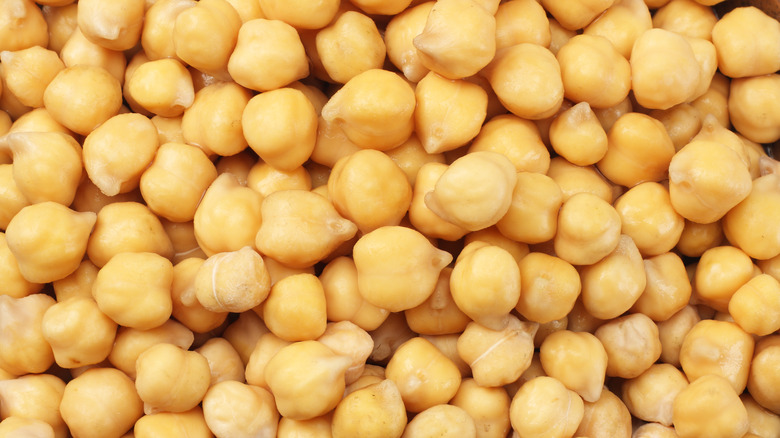The Easiest Swap For Making Tuna Salad Vegan
Making tuna salad with a tin of tuna is quick, convenient, and inexpensive. Your average can of albacore is nutritious as it's rich in Vitamin D with an abundance of Omega-3s, low-carb, and high-protein (per ScienceDirect). But there are other points that might make you want to avoid eating canned tuna, such as the high-mercury content, the issue of sustainability, its fishy odor, and the possibility of Scombrotoxin, a kind of food poisoning. In addition, per Eat This, Not That!, anyone with high blood pressure, heart disease, or diabetes, should watch their tuna intake due to its high-sodium count which averages 200-300 milligrams per serving.
If you are looking for an alternative to tuna, there's a vegan version from The Conscientious Eater. You might like the taste and texture even more than the standard tuna salad made with mayo. A mock tuna salad is easy to make, and vegan-friendly substitutions are easy to find. Preparing it is as easy as opening a different can — one that's filled with plant-based goodness.
Canned chickpeas are a good alternative
In place of tuna, The Conscientious Eater uses chickpeas, also known as garbanzo beans or "ceci" beans in Italian. The recipe calls for replacing regular mayonnaise, which is made from eggs and oil, with tahini, a rich paste made from ground sesame seeds. Vegan mayo or olive oil are other good substitutes for mayo. These vegan mayo alternatives are only slightly lower in fat and calories, but offer one clear health benefit — they are cholesterol-free. Other vegan interpretations use sunflower seeds, walnuts, or tempeh in exchange for tuna.
You can mash the legumes by hand or in a food processor and stir tahini into the chickpea mash. Add vinegar, lemon juice, celery, onion, garlic, salt, and pepper. If you prefer a more authentic, fishier taste, add in wakame (Japanese seaweed), dulse flakes, or kelp granules, which add extra nutrition too. Just like original tuna salad, you can eat this on toast or crackers, atop a bed of lettuce, or by itself.
The benefits are uncanny
Unlike many canned vegetables, chickpeas retain much of their nutritional value, according to Harvard's School of Public Health. One cup of chickpeas has 14.5 grams of protein. Containing all nine essential amino acids, Cleveland Clinic reports that they are considered a complete protein. They are also a good source of magnesium, potassium, folate, choline, and iron. These little beauties are high in Vitamins A, E, and C, minerals, and antioxidants, too.
There's another bonus to using chickpeas, especially for those following a plant-based diet. When draining them from the can, be sure to keep the rich, starchy liquid, called aquafaba, to use in other recipes as a replacement for eggs. Fun fact: Celebrity chef Alton Brown uses aquafaba to make egg-free meringues.
Whether you are tired of your traditional tuna salad, going vegan, or just looking for a healthier dish, subbing canned chickpeas for that tin of tuna may be just what you're looking for.


